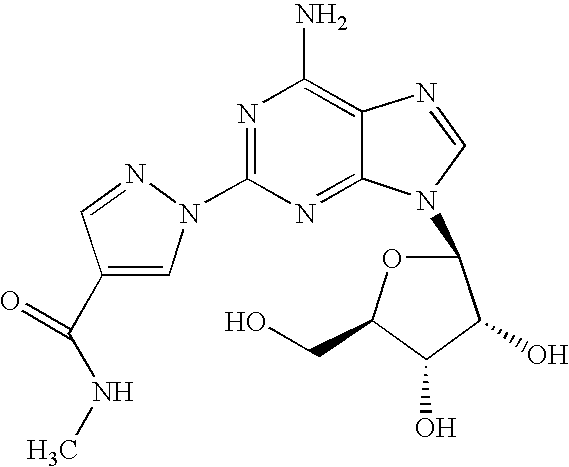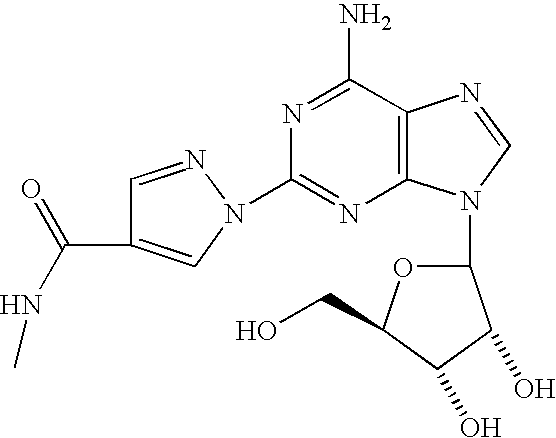Use of A2A adenosine receptor agonists
a technology of adenosine receptor and adenosine, which is applied in the field of myocardial imaging methods, can solve the problems of limited use, increased risk of stroke, and increased risk of stroke, and achieve the effect of increasing the average coronary peak flow velocity
- Summary
- Abstract
- Description
- Claims
- Application Information
AI Technical Summary
Benefits of technology
Problems solved by technology
Method used
Image
Examples
example 1
[0034]The purpose of this study was to investigate the pharmacokinetics (PK), pharmacodynamics (PD), and the maximum tolerated dose of regadenoson in healthy human subjects.
[0035]Thirty-six healthy, male subjects were included in the study. Subjects received single, IV bolus doses of regadenoson ranging from 0.1 to 30 μg / kg. The regadenoson dosage administered in this example and in Examples 2 & 3 below was a neutral pH dose including the preferred ingredients discussed above. Concentrations of regadenoson were determined in plasma samples collected at various times and in urine samples collected over a 24-hour period after drug administration. ECG, blood pressure (BP), and heart rate (HR) were recorded for up to 24 hours post-dose. Adverse events (AE) were monitored for 24 hours post dose and via telephone 7 days later. A population approach was utilized in applying a three-compartmental PK model to the plasma concentration-time and a Michaelis-Menten model to the time-course of he...
example 2
[0038]The purpose of this study was to investigate the pharmacokinetics (PK) and pharmacodynamics (PD) of regadenoson in subjects undergoing clinically indicated cardiac catheterization.
[0039]Thirty-six male and female subjects undergoing clinically indicated coronary angiography were studied. Subjects received single, IV bolus doses of regadenoson ranging from 10 to 500 μg. Concentrations of regadenoson were determined in plasma samples collected at various times prior to and after drug administration. ECG, average coronary peak flow velocity (APV), measured using intracoronary Doppler flow wire, blood pressure (BP), and heart rate (HR) were continuously monitored for up to 3 hours post-dose. Occurrence of adverse events (AEs) was monitored for approximately 3 hours post dosing and via telephone approximately 14 days later. A population approach was utilized in applying PK and PD models to the plasma concentration, APV, and HR data. The potential influence of various covariates on ...
example 3
[0042]Regadenoson is a selective A2-adenosine receptor agonist under development for acute dilation of the coronary arterial vasculature during myocardial perfusion imaging. A2A-adenosine receptor activation is reported to cause inhibition of platelet aggregation and neutrophil activation.
[0043]To characterize the drug more completely, in this study, we determined affinity and potency values for binding and for functional responses to regadenoson in preparations of human platelets and neutrophils (membranes and intact cells), CHO cells expressing human A2A receptors (membranes and intact cells), and rat brain striatal membranes. For comparison, parallel assays of responses to the reference A2A agonist CGS21680 were performed alongside each assay of regadenoson. Assay results are reported in Table 1 below.
[0044]
TABLE 1Values (mean ± SE) of affinity [Ki] and potency [EC50 orIC50] for regadenoson at A2A-adenosine receptorsPreparationHumanHumanCHO hisA2A-exRatAssayplateletsneutrophilspr...
PUM
| Property | Measurement | Unit |
|---|---|---|
| coronary peak flow velocity | aaaaa | aaaaa |
| flow velocity | aaaaa | aaaaa |
| peak flow velocity | aaaaa | aaaaa |
Abstract
Description
Claims
Application Information
 Login to View More
Login to View More - R&D
- Intellectual Property
- Life Sciences
- Materials
- Tech Scout
- Unparalleled Data Quality
- Higher Quality Content
- 60% Fewer Hallucinations
Browse by: Latest US Patents, China's latest patents, Technical Efficacy Thesaurus, Application Domain, Technology Topic, Popular Technical Reports.
© 2025 PatSnap. All rights reserved.Legal|Privacy policy|Modern Slavery Act Transparency Statement|Sitemap|About US| Contact US: help@patsnap.com


